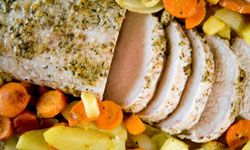 “A slice of vegetable frittata can be just the thing to cut the salt. See more light dinner pictures.iStockphoto/Thinkstock
“A slice of vegetable frittata can be just the thing to cut the salt. See more light dinner pictures.iStockphoto/Thinkstock
One of the best things you can do for your health is to monitor your sodium intake. Beyond the obvious immediate effects like puffy fingers, swollen feet and a bloated belly, sodium can contribute to more serious health problems such as high blood pressure and fluid retention. Your physical appearance is one thing, but your overall health is quite a different story. And it’s not something to mess around with.
Many packaged foods have way more sodium in a single serving than you should be eating in a full day, and a lot of supposedly healthy recipes contain hidden sources of sodium, so you should always take a look at the nutrition breakdown before choosing one. One teaspoon of salt has 2,300 milligrams of sodium, which is 300 milligrams more than the recommended daily allowance. A low-sodium diet means eating no more than 1,500 milligrams of the stuff daily, so to make things a bit simpler, we’ve compiled 10 dinner recipes that are easy on the salt — and you.
Contents
- Zucchini-Tomato Frittata
- Tomato Cream Soup
- Balsamic Roasted Chicken
- Pesto Pomodoro Sauce
- Salmon Patties
- Chicken Cacciatore
- Mallorca-style Vegetable Bake
- Moroccan Turkey Stew
- Grilled Fish With Herbs
- Pot Roast With Vegetables
10: Zucchini-Tomato Frittata
Breakfast for dinner is a perennial favorite, and this frittata is certain to please even the most discerning palate. It’s full of healthy veggies like zucchini, broccoli, bell peppers and green onions and accented with fresh basil and red pepper. Egg whites and low-fat cottage cheese cut the fat count, and each serving is naturally low in sodium. And an extra bonus: It’s easy and quick to make. Just sauté the veggies, combine the rest of the ingredients with the eggs and cook in the skillet.
Did You Know?
Frittata is the Italian version of an omelet. It’s cooked and served in one layer rather than folded like a traditional omelet.
9: Tomato Cream Soup
 “Got leftovers? This soup freezes well.iStockphoto/Thinkstock
“Got leftovers? This soup freezes well.iStockphoto/Thinkstock
Who says low-sodium soups have to be tasteless and boring? You can make a creamy, satisfying batch that’s still full of flavor without adding too much salt. Tomato cream soup is the perfect antidote to a chilly evening, and it’s a hit with kids of all ages when paired with a gooey grilled cheese sandwich. By using water or low-sodium stock, as well as fresh or no-salt-added canned tomatoes, you can keep this dish savory yet healthy.
8: Balsamic Roasted Chicken
Roasting chicken with balsamic vinegar is a great alternative to using salty marinades. You can cook the bird whole, break it down into pieces or just use the breasts or drumsticks. Seasonings such as rosemary, thyme, sage, garlic and pepper help enhance the flavor of the poultry without the addition of salt, and the longer you let the meat marinate, the better it will taste. Right before serving, add a splash of balsamic vinegar and a pinch of brown sugar over the chicken to give it a subtle sweetness.
Did You Know?
Vinegar may have many health benefits beyond a salt substitute. Studies have shown that it may help control blood sugar levels in diabetics, as well as help to increase calcium absorption.
7: Pesto Pomodoro Sauce
 “Spoon the pomodoro over a protein-filled ravioli, and dinner is served!iStockphoto/Thinkstock
“Spoon the pomodoro over a protein-filled ravioli, and dinner is served!iStockphoto/Thinkstock
This heat-and-eat pesto pomodoro sauce is easy as pie and just about as tasty. Simply simmer some chopped onions, canned tomatoes and a few dollops of pesto until the sauce thickens. Serve with your pasta of choice and add chicken breast or another meat if you want a more filling meal.
Of course, to be sure you’re eating quality ingredients with as little sodium as possible, it’s best to use fresh or no-salt-added tomatoes and to make your own pesto instead of reaching for a premade sauce. Regardless if you go homemade or store-bought, pesto is so versatile that you’ll have no problem using the leftovers in dips, as a pizza topping or thinned out with olive oil for a salad dressing.
6: Salmon Patties
Packed with protein, salmon is a versatile fish to cook on its own or in a variety of recipes. Making patties from the fish is easy to do with ingredients you probably already have in your pantry. All you need is fresh or canned salmon, dill, garlic and an egg. Feel free to add other seasonings too, such as minced onions, parsley or a pinch of red pepper. To cut down on fat, bake the patties in the oven rather than pan-fry them, and serve with a salad to complete this light yet filling meal.
Know Your Sodium Levels
Fruits and vegetables are naturally low in sodium, but what about proteins? For a 3-ounce serving, fish such as salmon and halibut are lowest, with about 50 to 60 milligrams. Chicken, red meat, pork and fresh turkey contain about 70 to 80 milligrams, and shellfish have about 100 to 300 milligrams of sodium.
5: Chicken Cacciatore
Chicken cacciatore is easy on the salt yet heavy on the flavor. Vegetables including zucchini, onions and mushrooms, as well as a light tomato sauce, pack a taste punch in this traditional Italian dish. This meal is simple to prepare and can be made ahead of time, too. Serve over brown rice instead of pasta to get some extra fiber in your diet.
4: Mallorca-style Vegetable Bake
 “You can never go wrong with veggies, so load up!iStockphoto/Thinkstock
“You can never go wrong with veggies, so load up!iStockphoto/Thinkstock
One of nature’s tastiest dishes is roasted vegetables, and the health benefits are bountiful. Veggies are naturally low in fat and sodium and high in fiber and nutrition. For a flavor fiesta, whip up these Mallorca-style baked vegetables. Zucchini, eggplant, potatoes, garlic and tomatoes are seasoned with basil, oregano, pepper and just a pinch of salt to spice things up, and they make a great side for a roasted pork loin, grilled seafood or sautéed fish. Tuck the leftovers inside a pita pocket for a hearty vegetarian sandwich.
3: Moroccan Turkey Stew
Moroccan turkey stew is spicy dish with an African influence that’s sure to be a crowd-pleaser. This belly-warming soup is chock full of carrots, sweet potatoes, onions and garlic and is spiced with cumin, ginger, cinnamon and a mere dash of salt. Cooking this dish is as easy as sautéing the veggies and meat, stirring in the spices and simmering everything together. You could even leave out the turkey to make this stew vegetarian. Serve over couscous and top with chopped pistachios for a traditional garnish.
Not Just the White Stuff
Salt is found all over the globe, and it comes in a variety of textures, colors and strengths. Gray salt from France, pink salt from the Himalayas and Persian blue salt all have distinct flavors that are used for a variety of cooking methods.
2: Grilled Fish With Herbs
Fish is naturally low in sodium and easy to prepare. Grilling it takes just minutes, and it’s one of the healthiest cooking methods out there. Marinate the firm-fleshed fish of your choice with olive oil, garlic and whole sprigs of fresh herbs such as rosemary, thyme and parsley. Put both the fish and seasonings on the grill, and as everything cooks, the stems of the herbs will impart a subtle smoky taste to the flesh. The final flavor flourish is a squeeze of fresh lemon juice over the food after you take it off the grill.
1: Pot Roast With Vegetables
 “Root veggies such as carrots, onions, parsnips and potatoes hold up well during the roast’s long cooking time.iStockphoto/Thinkstock
“Root veggies such as carrots, onions, parsnips and potatoes hold up well during the roast’s long cooking time.iStockphoto/Thinkstock
Pot roast with veggies is classic comfort food that achieves maximum flavor without the need for a lot of salt and other seasonings. It’s easy to fall into a high-sodium trap when cooking roasts by using soup mixes or bouillon cubes that are loaded with salt, but supermarkets these days offer several brands of low- and no-sodium stock and broth that will flavor your dish just as well. And the real key to developing this dish’s signature richness is through its long, gentle cooking that naturally brings out the flavors of the food. This meal tastes even better the next day — if it doesn’t get gobbled up all at once, that is.
Lots More Information
Related Articles
- 5 Delicious Low-sodium Soups
- 5 Low-sodium Cheeses
- 5 Sodium Myths Debunked
- Cleaning Your Home With Salt Quiz
- Health Benefits of Vinegar
- What are the low-sodium seasonings, if they exist?
Sources
- Cleveland Clinic. "Eat Right: Low-Sodium Diet Guidelines." (Jan. 13, 2012) http://my.clevelandclinic.org/healthy_living/nutrition/hic_low-sodium_diet_guidelines.aspx
- Gubler, Fritz and David Glynn. "A Guide to Salt Varieties." Veg Kitchen. (Jan. 13, 2012) http://www.vegkitchen.com/tips/natural-foods-guides/a-guide-to-salt-varieties/













































